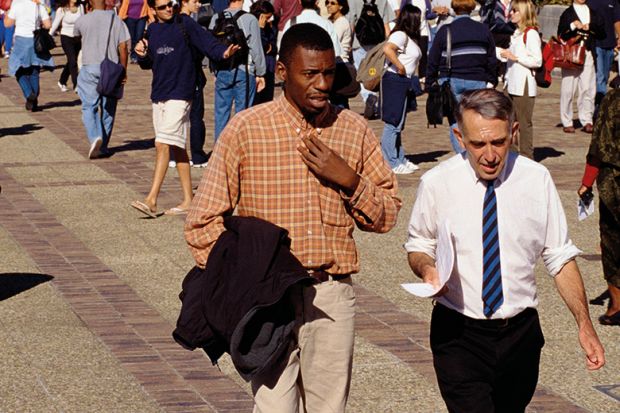Black academics will outnumber white scholars in South African universities within the next decade as thousands of older white lecturers retire, research shows.
At present, some 49 per cent of academics in South Africa are white compared with the 35 per cent of academics who are black, while another 10 per cent are of Indian descent, says a new demographic profile of the country’s 25 universities.
However, the gap between black and white academics has closed substantially since 2005 when 60 per cent of academics were white and just 26 per cent were black, according to the paper, “The changing demography of academic staff at higher education institutions in South Africa”, published in Higher Education.
That “upwards trajectory of black African academics” and a “concomitant downward trajectory of white academics” between 2005 and 2015 is likely to continue and possibly accelerate in coming years, say the paper’s authors Gregory Breetzke, from the University of Pretoria, and David Hedding, from the University of South Africa.
That is because the “age trends of black African academics are the direct opposite of white academics”, with black African academics having a mean age of 40 and “becoming younger”, whereas white academics were on average 47 and “becoming older”, the two geographers state.
With more than 4,000 largely white academics – about 27 per cent of the total – set to retire over the coming decade, this will create opportunities for a growing cohort of younger black academics to enter more senior positions, they add.
In fact, black academics are set to outnumber white scholars in South African universities at some point between 2020 and 2025, Dr Breetzke told Times Higher Education.
“Regardless of the exact date, this will be a major milestone,” he said. However, there was “still a long way to go when you consider that over 80 per cent of the population in South Africa is black African”, he added.
The paper stresses that the “true transformation of academic staff is not a numbers game” and raw numbers alone may hide major racial imbalances in the country’s academy.
For instance, while 64 per cent of academics at historically black universities are black, up from 55 per cent in 2005, just 20 per cent of staff at historically white universities are black, up from 14 per cent in 2005. And while 15 per cent of professors are black – compared with 75 per cent who are white – half of all black professors are located at three historically black universities, the universities of South Africa and Limpopo, as well as Walter Sisulu University.
“Transformation across all ranks, but particularly at the level of professor, will be crucial going forward,” Dr Breetzke told THE, adding that “traditionally white universities should continue with transformation initiatives and investigate mechanisms to recruit and retain promising black African academics”.
One of the “primary” hurdles to the career progression of black African academics was the low rate of PhDs among staff, with only 34 per cent of black academics holding a doctorate.
The government was “starting to address [this] through programmes [but] such is the demand for highly qualified black African professionals in the private sector, that universities often struggle to compete financially to attract and retain black African academics once they obtain PhDs”, Dr Breetzke added.




